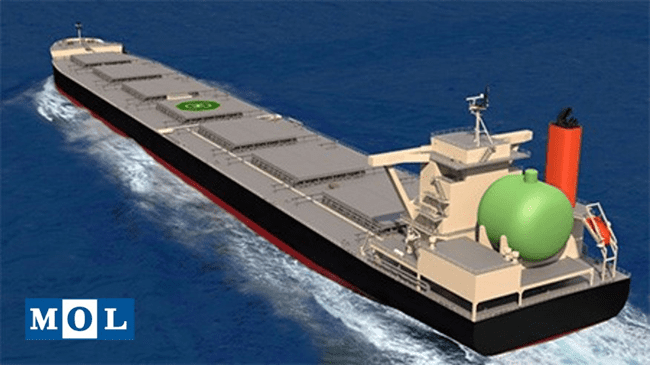

Contributing to the reduction of environmental impact of LNG-fueled vessels
Hitachi Zosen Corporation (Hitachi Zosen), Mitsui O.S.K. Lines, Ltd.(MOL) and Yanmar Power Technology Co., Ltd. (YPT) have proposed “Development of Methane Slip (Note 1) Reduction Technology from LNG Fueled Vessels by Improving Catalysts and Engines” (hereinafter referred to as “the Project”) with Hitachi Zosen as the managing company in the “Development of Next Generation Vessels Project” publicly solicited by the New Energy and Industrial Technology Development Organization (hereinafter referred to as “NEDO”) under the Green Innovation Fund. The proposal was adopted.
In recent years, environmental awareness, including responses to climate change, has been increasing worldwide. Against this backdrop, the shipping industry is also working on various technological and business developments to realize a low-carbon society. One of these efforts is the introduction in various parts of the world of LNG-fueled ships, which have a low environmental impact. LNG fuel has the effect of reducing CO2emissions, but engines using LNG can be prone to the problem of methane slip, where unburned fuel is expelled in the exhaust. Reducing methane slip is a pressing issue in engine design.
In this project, the partners aim to achieve a methane slip reduction rate of more than 70% for LNG-fueled vessels over a six-year period from FY2021 to FY2026. The reduction will be achieved by combining methane oxidation catalysts and engine improvements thereby further reducing the environmental impact of LNG-fueled vessels. YPT will also commission Namura Shipbuilding Co., Ltd(Namura Shipbuilding), together with Hitachi Zosen and MOL to establish the technology to install the system developed in this research on actual ships.
The system will be installed in a coal carrier built at the Namura Shipbuilding and operated by MOL for demonstration of the methane slip reduction technology. The partners will work to establish the technology as soon as possible with a view to utilizing carbon-recycled methane in future applications, reducing greenhouse gas emissions to zero by 2050 towards realizing a carbon-neutral society.
(Note 1) Methane slip
A portion of the methane in LNG fuel is exhausted into the atmosphere as unburned methane. Methane has a higher greenhouse effect than CO2, and methane slip reduction is required from the perspective of greenhouse gas reduction.

Left: Yanmar’s 6EY22ALDF dual fuel engine; Right: Hitachi Zosen’s Methane Oxidation Catalyst (image)
Hitachi Zosen
Hitachi Zosen has been supplying NOx removal catalysts and NOx removal systems to domestic and overseas applications for over 50 years. In addition, since 2015, Hitachi Zosen has been installed in marine diesel engines to provide solutions required for air pollution prevention.
Utilizing the technology cultivated as the only manufacturer of both “catalysts” and “marine diesel engines” in Japan, Hitachi Zosen will develop catalysts that oxidize slipped methane in this project. Hitachi Zosen will contribute to the prosperous future of the earth and people.
MOL
MOL is developing various social infrastructure businesses such as marine business and wind energy-related business, centering on the shipping business such as dedicated ships that carry various raw materials and fuels, tankers, and product transport ships such as automobiles. With the world’s largest fleet, experience, and technology cultivated over 130 years of history, and a spirit of challenge aiming to create new value, we are contributing to the development of the world economy and environmental conservation. In this project, we aim to further reduce the environmental load of LNG fueled ships by establishing the operation of methane reduction technology on actual ships. We will contribute to the reduction of greenhouse gas emissions from our vessels, the low-carbonization of customers’ supply chains such as shippers, and the low-carbonization of society as a whole.
Yanmar
With beginnings in Osaka, Japan, in 1912, Yanmar was the first ever to succeed in making a compact diesel engine of a practical size in 1933. A pioneer in diesel engine technology, Yanmar is a global innovator in a wide range of industrial equipment, from small and large engines, agricultural machinery and facilities, construction equipment, energy systems, marine, to machine tools, and components — Yanmar’s global business operations span seven domains. On land, at sea, and in the city, Yanmar provides advanced solutions to the challenges customers face, towards realizing A Sustainable Future.
For more details, please visit the official website of Yanmar Holdings Co., Ltd.
https://www.yanmar.com/global/about/
Help keep news FREE for our readers
Supporting your local community newspaper/online news outlet is crucial now more than ever. If you believe in independent journalism, then consider making a valuable contribution by making a one-time or monthly donation. We operate in rural areas where providing unbiased news can be challenging. Read More About Supporting The West Wales Chronicle

























